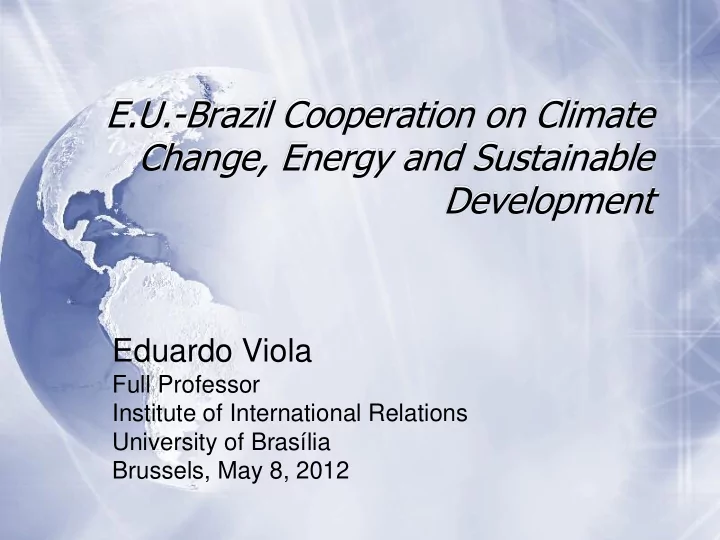

E.U.-Brazil Cooperation on Climate Change, Energy and Sustainable Development Eduardo Viola Full Professor Institute of International Relations University of Brasília Brussels, May 8, 2012
Share/Trajectory of Emissions, Capabilities Transition to Low carbon and Commitment to Global Governance in Brazil and E.U. Share of global carbon emissions in 2011:Brazil 4%, E.U. 12%. E.U. declining as emissor, Brazil stable. Trajectory 2002-2011: Brazil: +5%a 2002-2004; -5%a 2005- 2009; + 3%a 2010-11; E.U. +0.7a 2002-2011 very heterogeneous among countries. Availability of human and technological capital for transition to low carbon: Medium Brazil; High E.U. Both should have interest in strong increase in cooperation in science and technology. Degree of commitment with global governance: Medium Brazil, between strengthening national sovereignty and building global governance; High E.U. , the most committed player
Evolution of Brazil position in the multilateral negotiations on climate change 1- 1995-2000: conservative position in key issues (accounting of responsibilities, commitments of middle income countries, deforestation); progressive position CDM. 2- 2001-2002: ambivalent position, approve and ratify Kyoto but against voluntary commitments. 3- 2003-2005: conservative position 4- 2006-2008: gradual introduction of reformism. 5- 2009-2011: moderate reformist position
Brazil unique emissions profile (1) Less carbon intensive energy matrix among big players. 85% electricity derived from hydro. Largest proportion ethanol cars (energy inefficiency flex cars) High carbon intensive in cargo transportation because of road dependence and poor infra- structure. Worst record in the world 199-2010. Poor public transportation. Increasing promotion of private cars over public. Poor wind, no solar photovoltaic. Meat production high carbon intensive because very extensive cattle raising, conservative constituency. Still first world emitter from deforestation. Uncertainty about technology to be used in new pre- salt reserves: conservative versus reformist.
Brazil unique emissions profile 2 Most dramatic reduction in emissions in world history not derived from collapse in economy (reduction deforestation Amazon 2005-2009). From 25,000 KM2 in 2004 to 6,200KM2 in 2009. There was not further reduction in 2010-11. Still Brazil is the highest deforester in the world (close to Indonesia and Congo). Per capita income 4 times higher Indonesia and 12 times higher Congo. Still bad situation. Lowest cost of emissions reduction so far. Large hydropower reserves. Only ethanol exporter in the world, but problems in 2010-12. Top ethanol potential in the world. High wind and solar potential.
Brazil shift in climate policy, November 2009 Multiple factors driving transformation: NGOs, corporations, Amazonian governors, deepening of divisions in national government, presidential candidate Marina Silva. Environmental Ministry more assertive than Science-technology/Foreign Affairs. Commitments for 2020: 36-39% reduction in relation to BAS 21-25% reduction from deforestation. No more coal/oil power plants. Rationalization of agriculture and cattle raising. Poor in energy efficiency and transportation. New climate laws: national and São Paulo state. Dissonance between climate policy domestic and foreign.
Brazil position in COPs 15-16-17: ambivalent country and divided government French/Brazilian partnership for climate (November 2009) the most progressive moment in Brazilian climate foreign policy. Critics to USA and China. Conflict within government about how to proceed in cop 15 negotiations. Prevail of Foreign Affairs over Environment Ministry. Ambitious commitment should not apply to China and India. Lula progressive speech in Copenhagen. Brazil in COP 17 taking distance from China and India, trying to bridge E.U., USA, China and India. Poor implementation of the climate law, very conservative new industrial policy in 2011-12.
European Union situation Leaders of climate policy, Scandinavians, UK, Germany, France. Conservative countries limits. E.U. heavily dependent on imported energy (oil and natural gas). Systemic policies of de-carbonization in Denmark, Sweden and Germany. Promotion of wind/solar/biofuels, particularly Denmark, Germany, Spain, Portugal, UK. Confrontation between Germany and France about nuclear energy. Example of international smart greed cooperation in Norway-Denmark-Sweden.
Divergence and Convergence of Brazilian and European Climate/energy policy (1) UNFCCC/Kyoto Protocol: history different positions with some moments of proximity. Major divides: interpretation of responsibilities, power of global institutions, perception of climate threat. Reduction of deforestation in Brazil increased dramatically potential for cooperation, but not effective yet. Norway effective, not E.U. Common interest in promotion of bio-fuels but differences in details and implementation. E.U. poor understanding of ethanol environmental impacts in Brazil. Wind/solar development of E.U. could benefit Brazil. Transnational. Brazil energy secure, E.U. energy insecure. E.U. more inclined to CCS than Brazil. Norway/E.U. could promote CCS in Brazil oil/gas. Potential cooperation in nuclear (France), building efficient hydro in rest of world and smart greed.
Divergence and Convergence of Brazilian and European Climate/energy policy (2) In the G20 arena: progressive position of E.U. (in favor of linking economy with climate/energy) and conservative Brazil (against, shaped by the BRICS alliance). Promising future. In the Rio + 20 arena: progressive position of E.U. in favor of strengthening global environmental governance and supporting green economy. Brazil inclined to the conservative position of BRICS, was a major responsible for the dilution of agenda. The Brazilian national document for the Rio +20 was very poor and implied a reversion of the progress made with the passing of the climate change law in 2009. Potential alliances of transnational forces oriented toward de- carbonizing in both societies: industry, energy, transportation, forestry and science and technology.
Recommend
More recommend